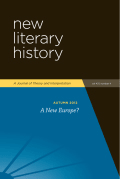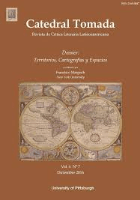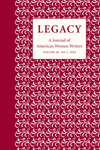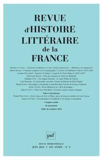
REVISTA CHILENA DE LITERATURA
Scope & Guideline
Exploring the depths of literature and theory.
Introduction
Aims and Scopes
- Interdisciplinary Literary Studies:
The journal embraces an interdisciplinary approach, integrating literary theory, cultural studies, and historical perspectives, which allows for a rich analysis of texts across various genres and periods. - Focus on Latin American Literature:
A central focus of the journal is the exploration of Latin American literature, including critical examinations of canonical and contemporary works, allowing for a deeper understanding of regional literary movements. - Gender Studies and Feminist Perspectives:
The journal consistently addresses issues related to gender and feminism, showcasing the contributions of female authors and exploring the intersection of gender with literary narratives in Latin America. - Cultural and Political Contexts:
The exploration of literature within its cultural and political contexts is a recurring theme, analyzing how literature reflects and critiques societal issues, historical events, and power dynamics. - Theoretical Frameworks:
The journal frequently employs various theoretical frameworks—such as psychoanalysis, post-colonial studies, and critical theory—to provide nuanced interpretations of literary texts.
Trending and Emerging
- Post-Colonial and Decolonial Perspectives:
There is a notable increase in scholarship addressing post-colonial and decolonial themes, emphasizing the importance of indigenous voices and the complexities of identity within Latin American literature. - Interdisciplinary Approaches to Literature:
Emerging themes highlight the blending of literature with other disciplines, such as visual culture, psychoanalysis, and digital humanities, signaling a trend towards more holistic literary studies. - Environmental and Ecocritical Literature:
A growing focus on environmental themes and ecocritical perspectives reflects a response to global ecological issues, as literature is increasingly viewed as a means to engage with and critique environmental challenges. - Contemporary Feminist Discourses:
Recent publications emphasize contemporary feminist discourses, exploring how modern literature engages with gender politics, intersectionality, and the evolving role of women in society. - Literature and Memory Studies:
An emerging trend in the journal is the exploration of memory and trauma in literature, particularly in relation to historical events and collective memory, which underscores the significance of narrative in processing social experiences.
Declining or Waning
- Traditional Canonical Studies:
There seems to be a decline in the focus on traditional canonical works of literature, as the journal increasingly prioritizes contemporary voices and emerging writers over established classics. - Formalism and Structuralism:
Though once a staple in literary criticism, formalist and structuralist approaches appear to be less prevalent in recent issues, with scholars favoring more dynamic and contextually grounded methodologies. - Eurocentric Perspectives:
The journal has shifted away from Eurocentric literary critiques, reflecting a growing emphasis on local and indigenous narratives that challenge traditional Western literary paradigms. - Nostalgic or Romantic Literature:
Themes related to nostalgia or romanticism in literature have decreased, indicating a preference for current socio-political issues and modernist approaches that address contemporary realities.
Similar Journals

NEW LITERARY HISTORY
Exploring the Depths of Literary ThoughtNEW LITERARY HISTORY is a premier journal in the field of Literature and Literary Theory, published by Johns Hopkins University Press. With an impact factor that places it in the prestigious Q1 quartile of academic publishing, this journal stands out as a leading voice in literary scholarship. Since its inception in 1983 and through its convergence years until 2024, NEW LITERARY HISTORY has been at the forefront of critical debates, offering innovative theoretical frameworks and historical perspectives on literary studies. The journal is indexed in Scopus, ranking in the top 3% of literature publications globally (Rank #28/1106), making it an essential resource for researchers, professionals, and students alike. Although it operates under a traditional access model, the unparalleled quality of its content ensures that it remains a vital platform for disseminating cutting-edge research and fostering intellectual dialogue within the humanities. Explore the rich and dynamic world of literary theory through NEW LITERARY HISTORY and contribute to the ongoing exploration of literature's impact on culture and society.

ROMANISTISCHE ZEITSCHRIFT FUR LITERATURGESCHICHTE-CAHIERS D HISTOIRE DES LITTERATURES ROMANES
Unraveling the Histories of Literary ExpressionROMANISTISCHE ZEITSCHRIFT FUR LITERATURGESCHICHTE-CAHIERS D HISTOIRE DES LITTERATURES ROMANES, published by Universitätsverlag C Winter Heidelberg GmbH, represents a significant contribution to the field of literary studies, focusing on the intricate histories of Romance literatures. With an ISSN of 0343-379X and an E-ISSN of 2509-7474, this journal strives to foster critical discourse among scholars, professionals, and students interested in literature and literary theory. Although its coverage in Scopus was discontinued in 2018, and it currently lacks open access options, the journal's past contributions have established it as a noteworthy resource, with a Scopus rank that reflects its engagement with the arts and humanities. The journal's unique scope, which spans various periods and styles, encourages interdisciplinary approaches and invites submissions that explore the evolution and impact of Romance literature across cultures. As a critical platform for emerging and established voices in the field, the ROMANISTISCHE ZEITSCHRIFT continues to be a valuable asset for those dedicated to the scholarship of literary history.

Catedral Tomada-Revista de Critica Literaria Latinoamericana-Journal of Latin American Literary Criticism
Illuminating Diverse Perspectives in Literary CriticismCatedral Tomada - Revista de Crítica Literaria Latinoamericana is a pioneering journal dedicated to the exploration and critique of Latin American literature and its broader cultural implications. Published by the University of Pittsburgh's Library System, this Open Access journal has been instrumental since its launch in 2013 in making scholarly discussions accessible to a wider audience. With an ISSN of 2169-0847, the journal serves as a vital platform for researchers, professionals, and students interested in Literature and Literary Theory, Cultural Studies, and Linguistics and Language. Its esteemed ranking places it in Quartile 1 for Literature and Literary Theory and Quartile 2 for the other categories, underlining its commitment to high-quality academic discourse. Converging insights through a quarterly publication schedule from 2019 to 2024, Catedral Tomada aims to foster a rich dialogue on Latin American literary criticism, encouraging innovative perspectives and diverse voices within the field.

LEGACY
Illuminating Diverse Perspectives in Literature and GenderLEGACY is a prominent journal published by University of Nebraska Press, dedicated to exploring the multifaceted relationships between literature, culture, and gender studies. With an ISSN of 0748-4321, this journal has established itself as a platform for critical discourse since its inception in 2002. As a Q4 ranked publication in both Gender Studies and Literature and Literary Theory, LEGACY engages with diverse perspectives and timely topics, providing a unique opportunity for scholars to contribute to ongoing debates in these fields. Although it does not operate under an open access model, its content remains essential for researchers, professionals, and students seeking to expand their knowledge and understanding of complex literary and gender issues. With a commitment to enriching the academic landscape, LEGACY aims to foster dialogue and inspire future scholarship through its thoughtful articles and critical analyses.

Revue Italienne d'Etudes Francaises
Fostering Scholarly Dialogue Across CulturesRevue Italienne d'Etudes Francaises, published by SEMINARIO FILOLOGIA FRANCESE, is a pivotal open access journal dedicated to the exploration and analysis of French studies within the broader context of history, linguistics, and literary theory. Since its inception in 2011, this journal has fostered scholarly dialogue and critical discourse, offering a platform for researchers, professionals, and students alike to disseminate their work and engage with contemporary issues in these fields. With an ISSN and E-ISSN of 2240-7456, the journal has established itself within the academic community, although it currently ranks in the lower quartiles across various disciplines, as indicated by its Scopus metrics. Nevertheless, the Revue Italienne d'Etudes Francaises remains an essential resource for those seeking to deepen their understanding of Francophone literature, culture, and linguistic dynamics from its base in Rome, Italy, at C/O Fondazione Primoli. As the field of French studies continues to evolve, this journal plays an important role in highlighting the latest research findings and theoretical advancements.

Dirasat Hispanicas-Revista Tunecina de Estudios Hispanicos
Empowering Scholars with Open Access InsightsDirasat Hispanicas-Revista Tunecina de Estudios Hispanicos is a pivotal academic journal published by UNIV TUNIS MANAR, INST SUPERIEUR SCIENCES HUMAINES TUNIS, dedicated to the exploration and analysis of Hispanic studies within the broader context of history, linguistics, and literature. Established in Tunisia, this journal has transitioned to an Open Access model since 2014, promoting the dissemination of knowledge and fostering scholarly exchange among researchers, professionals, and students globally. With its ISSN 2286-5977 and esteemed recognition in various categories, including Q4 in History and Linguistics and Q3 in Literature and Literary Theory, Dirasat Hispanicas strives to bridge gaps in Hispanic scholarship by inviting diverse critical perspectives and innovative research. While its Scopus rankings reflect an evolving presence in the academic landscape, the journal remains committed to enhancing the visibility and impact of Hispanic studies. The journal continues to encourage submissions that contribute to its mission of intellectual advancement, making it an essential resource for those engaged in the rich tapestry of Hispanic cultural and linguistic heritage.

CRITICA LETTERARIA
Exploring the Depths of Literary DiscourseCRITICA LETTERARIA is an esteemed literary journal published by Paolo Loffredo Iniziative Editoriali SRL that has been contributing to discussions in the field of literature and literary theory since its inception in 2009. With an ISSN of 0390-0142 and an E-ISSN of 2035-2638, this journal is indexed in Scopus, ranking in the category of Arts and Humanities under Literature and Literary Theory. It is classified in the Q4 quartile, indicating its dedication to serving a niche yet vital discourse within the broader literary community. Although currently not open access, the journal offers a platform for scholars, researchers, and students to engage with diverse literary analyses and theoretical advancements. Located in the vibrant city of Naples, Italy, CRITICA LETTERARIA aims to foster academic dialogue and promote innovative approaches in literary studies, making it an important resource for anyone passionate about navigating the complexities of literary narratives and theory.

REVUE D HISTOIRE LITTERAIRE DE LA FRANCE
Delving into the Legacy of Literary GreatsREVUE D'HISTOIRE LITTERAIRE DE LA FRANCE, published by Classiques Garnier, is a distinguished academic journal dedicated to the exploration and analysis of French literary history and theory. With an ISSN of 0035-2411 and an E-ISSN of 2105-2689, this journal serves as an essential resource for researchers, professionals, and students in the fields of literature and the humanities. Though it does not currently offer open access, its rigorous scholarship contributes significantly to the understanding of historical literary movements and their cultural contexts. Despite its discontinuation in Scopus after 2016, the journal has a notable academic pedigree, providing critical perspectives on literature from the past to the contemporary era. Situated at 6 Rue de la Sorbonne, Paris 75005, France, the journal aims to enrich the discourse surrounding literary theory and history, highlighting its enduring relevance in today's scholarly landscape.

Cuadernos Lirico
Advancing Scholarship in Literature and TheoryCuadernos Lirico is a prestigious academic journal dedicated to the exploration of literature and literary theory, published by CUADERNOS LIRICO. With an ISSN of 2263-2158 and E-ISSN 2262-8339, this journal has been committed to open access since 2011, ensuring wide dissemination of its research across the globe. Based in France, the journal serves as a vital platform for scholars and practitioners, promoting innovative discourse within its field. Despite its current position in Q4 of the Literature and Literary Theory category and a Scopus rank of #993/1106, Cuadernos Lirico aims to bolster its impact through the publication of high-quality, peer-reviewed articles that contribute to the understanding and analysis of literary texts and theories. The journal invites contributions that engage with diverse perspectives and methodologies, fostering a rich dialogue among researchers, literary critics, and educators. Join us in advancing the scholarly pursuit of literature by contributing to this dynamic platform.

Valenciana
Driving transformative ideas in an open access landscape.Valenciana is an esteemed, peer-reviewed journal published by the University of Guanajuato, dedicated to advancing scholarly discourse in the fields of humanities and social sciences. Since its inception in 2008, this Open Access journal has facilitated unrestricted access to high-quality research, fostering collaboration and innovation among researchers, professionals, and students. With an ISSN of 2007-2538 and an E-ISSN of 2448-7295, Valenciana is committed to publishing original research, reviews, and theoretical contributions that illuminate contemporary issues and cultural phenomena. The journal not only serves as a platform for emerging voices in academia but also enhances its visibility in the global research landscape, driving interdisciplinary dialogue and engagement. Situated in Guanajuato, Mexico, Valenciana embraces the rich academic heritage of the region while also appealing to a broader audience, making it a vital resource for those seeking to explore new ideas and perspectives in their respective fields.